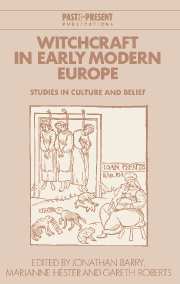Book contents
- Frontmatter
- Contents
- Preface
- Contributors
- 1 Introduction: Keith Thomas and the problem of witchcraft
- PART 1 THE CRIME AND ITS HISTORY
- PART 2 WITCHCRAFT AND RELIGION
- 5 The devil's encounter with America
- 6 ‘Saints or sorcerers’: Quakerism, demonology and the decline of witchcraft in seventeenth-century England
- PART 3 THE MAKING OF A WITCH
- PART 4 WITCHCRAFT AND THE SOCIAL ENVIRONMENT
- PART 5 DECLINE
- Index
- Past and Present Publications
6 - ‘Saints or sorcerers’: Quakerism, demonology and the decline of witchcraft in seventeenth-century England
Published online by Cambridge University Press: 06 July 2010
- Frontmatter
- Contents
- Preface
- Contributors
- 1 Introduction: Keith Thomas and the problem of witchcraft
- PART 1 THE CRIME AND ITS HISTORY
- PART 2 WITCHCRAFT AND RELIGION
- 5 The devil's encounter with America
- 6 ‘Saints or sorcerers’: Quakerism, demonology and the decline of witchcraft in seventeenth-century England
- PART 3 THE MAKING OF A WITCH
- PART 4 WITCHCRAFT AND THE SOCIAL ENVIRONMENT
- PART 5 DECLINE
- Index
- Past and Present Publications
Summary
‘Strange creatures, not like other men and women’ is how one Welsh Quaker described the contemporary response to his coreligionists. Mary Penington, an early Quaker convert, agreed: ‘to every class we were a by-word: they would wag the head at us, accounting us fools, mad, and bewitched [and] as such they stoned, abused and imprisoned us’. The rich literature of Quaker sufferings attests to the almost universal fear and hatred which first greeted their appearance on the stage of interregnum England. It is also an invaluable source for one particular accusation that was levelled at the Quakers with inordinate frequency, that of using diabolical witchcraft to promote the new heresy and subvert the established order. Historians of Quakerism have often noted this trend. More recently, Barry Reay has attempted to place such accusations within the wider framework of the perceived threat posed by the sect to social, religious and political order in mid-seventeenth-century Britain. Somewhat surprisingly however, historians of witchcraft have been slower to fasten on to the potential significance and meaning of this large body of evidence. In what follows, I hope to rectify this omission and to suggest possible ways in which the evidence of Quaker witchcraft might be used to shed important light on the history of educated belief in demonology in the second half of the seventeenth century. In particular, I wish to show its potential relevance to what Keith Thomas, in his pioneering work on witchcraft, has termed ‘the most baffling aspect of this difficult subject’, namely the roots of educated scepticism.
- Type
- Chapter
- Information
- Witchcraft in Early Modern EuropeStudies in Culture and Belief, pp. 145 - 180Publisher: Cambridge University PressPrint publication year: 1996
- 2
- Cited by



